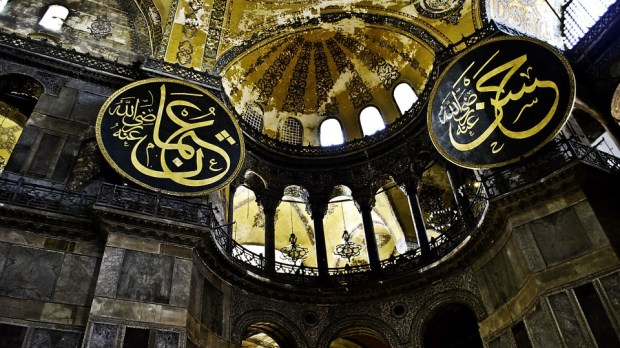After 86 years as a secular museum displaying the glories of both a Byzantine and Ottoman past, Hagia Sophia in Istanbul, Turkey, is once again a mosque.
Turkish President Recep Tayyip Erdoğan, who spearheaded the conversion of the historic building into a place for Islamic prayer services, attended the opening ceremony Friday, as an imam’s chanted prayers filled the cavernous former cathedral.
About 1,000 people joined him inside on a newly installed turquoise carpet, while others prayed on mats outside. Ancient Christian mosaic icons were covered with curtains. Islamic law forbids the depiction of human forms inside of mosques.
“Mr. Erdoğan arrived at noon, wearing a mask, and sat on the mosque floor, head bowed and eyes closed, listening to the melodic recitation of the Quran, which was carried live on national television,” the New York Times‘ Istanbul bureau chief Carlotta Gall reported. “At 1 p.m., the crowd fell silent and knelt in unison, as the head mufti, his hands clasped on the hilt of the sword of conquest, gave his sermon.”
Reuters reported that an imam began the formal prayer service at 1:45, “after Erdoğan read out a Koranic recitation and the call to prayer rang out from the mosque’s minarets.”
The building, now known as the Great Mosque of Ayasofya, was to remain open all night to allow people a chance to pray inside, said Ali Yerlikaya, the governor of Istanbul, in a televised news briefing.
Built by Justinian I in the 6th century, Hagia Sophia was the seat of the Church of Constantinope and the world’s largest cathedral. In 1453, after the Ottomans conquered Constantinople, it was turned into a mosque. Secularist reformer Kemal Mustafa Atatürk in 1934 ordered that it become a museum.
Earlier this summer, a Turkish court annulled that status, saying that any use other than as a mosque was “not possible legally.” On July 10, in an address to the nation, Erdoğan announced that Hagia Sophia would be reopened for Muslim worship on July 24.
Hagia Sophia is expected to continue welcoming sightseers when prayer services are not in session. Entrance fees are being dropped.
As many Muslims in Turkey and elsewhere celebrated the event, protests and expressions of regret continued. The Italian Association for Byzantine Studies, headed by Antonio Rigo at the Ca’ Foscari University of Venice, issued a statement saying, “Hagia Sophia is not merely a monument, but a rich and inexhaustible source of historical knowledge, a document open to investigation. Through its reversion back into a place of worship, with all the inevitable alterations this entails — it was destined to become closed and silent.”
As reported by the Times, the association said that Turkey was already conducting a slow but systematic effort to cover up its Byzantine past by making alterations in half a dozen Byzantine churches turned into mosques around the country. It deplored what it said was an “egregious display of intolerance and ideological narrowness” from Erdoğan and condemned what it described as exaltation of the violence of conquest. The association appealed to scholars and “members of humanity” to take a stand and prevent an “act of abuse against all peoples of the world and against their hopes for reconciliation and peace.”
The newspaper also said that “art historians lamented the covering of the basilica’s floor, famous for its variety of colored and patterned marbles, which are laid in geometric or symmetrical designs and act as important ritualistic or imperial markers, including of the place where emperors were crowned.”
The Vatican’s official news portal carried a report of Friday’s reopening, repeating the statement Pope Francis had made July 12, that he was “very saddened” when he thought about Hagia Sophia.

